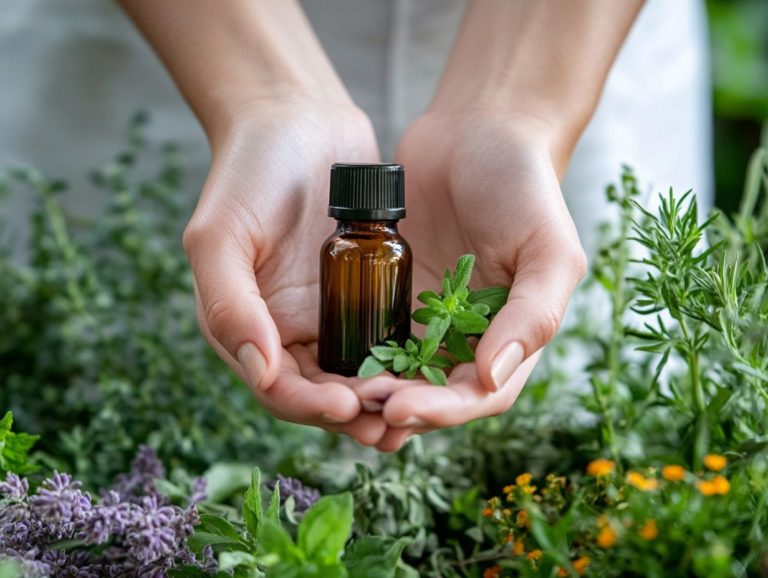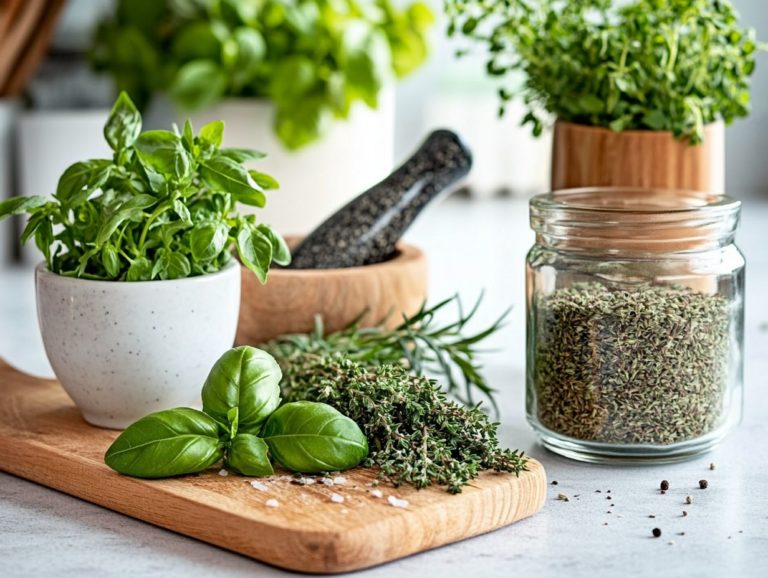What Are the Pros and Cons of Herbal Remedies?
Herbal remedies have been trusted allies for centuries. They form the foundation of alternative medicine and offer numerous health benefits. With origins steeped in ancient traditions, these remedies have found their way into contemporary wellness discussions, captivating the interest of many.
As enthusiasm grows, so do inquiries about their safety and effectiveness. This article delves into the realm of herbal remedies, illuminating their benefits, potential risks, and essential practices for safe usage. This enables you to effectively harness their healing properties.
Contents
Key Takeaways:

- Herbal remedies offer a natural and holistic approach to health and wellness, making them a popular choice.
- While herbal remedies can provide various benefits, be aware of potential risks and side effects, including interactions with medications and contamination concerns.
- To ensure safe and effective use of herbal remedies, consult with a healthcare professional and follow proper dosage and administration guidelines.
Overview of Herbal Remedies
Herbal remedies have a rich tapestry of health benefits from medicinal herbs. These natural substances come in various forms think teas, tinctures, and capsules designed to support your bodily functions and enhance wellness.
As your interest in herbal medicine deepens, grasping their efficacy, safety, and potential interactions with pharmaceuticals becomes essential for making informed choices that resonate with your health journey.
What are Herbal Remedies?
Herbal remedies are natural solutions derived from medicinal herbs that help improve health and ease various issues. These remedies tap into the remarkable healing powers of plants, many of which have stood the test of time across cultures.
Common ingredients you might encounter in popular herbal products include:
- Chamomile, known for its calming properties.
- Echinacea, celebrated for boosting the immune system.
- Ginger and turmeric, both known for their anti-inflammatory characteristics and often recommended for gastrointestinal issues and overall wellness.
By harnessing the plant chemicals found in these herbs, herbal remedies offer a holistic approach to healing. They address not just symptoms but also underlying conditions. Plus, they often come with fewer side effects compared to conventional medications, making them appealing for your health journey.
History and Popularity
The history of herbal medicine stretches back thousands of years. Ancient civilizations harnessed the healing properties of plants, paving the way for modern phytotherapy and the art of herbalism.
In various cultures, practitioners recorded their discoveries in significant texts, such as the ‘Pen Ts’ao Ching’ in China and ‘The Herbal’ by Nicholas Culpeper in England. Influential figures like Hippocrates, often hailed as the father of medicine, emphasized the vital role of plants in healing and left an imprint on generations to come.
This rich history has kept important knowledge alive, shaping contemporary practices and contributing to the resurgence of herbal remedies. Today, as holistic wellness trends gain momentum, there’s renewed appreciation for these ancient teachings, harmoniously blending them with best practices for herbal remedy use and modern scientific insights to enhance health and well-being.
Benefits of Herbal Remedies
The advantages of herbal remedies extend far and wide, offering numerous positive effects on health. They help boost your immune system, manage cardiovascular health, and promote hormone regulation.
These natural solutions can effectively address gastrointestinal issues and enhance the vitality of your skin.
In conclusion, exploring herbal remedies can be an exciting and beneficial journey. To understand more about their effectiveness, you might want to read about how herbal remedies work. Always remember to consult with healthcare professionals for safe practices and to maximize the potential benefits of these natural alternatives.
Natural and Holistic Approach

Embracing a natural and holistic approach through herbal remedies invites you to consider the entirety of your being body, mind, and spirit. This philosophy goes beyond just addressing symptoms; it is a fundamental principle of herbal medicine.
This approach highlights the intricate connections within your health, allowing for a deeper understanding of wellness. By focusing on not just the ailment but its root causes, practitioners strive to restore balance and foster enduring well-being.
Herbs like ashwagandha and chamomile are ideal examples; they are celebrated for their calming effects and ability to reduce stress, a common contributor to various health challenges.
Integrating herbal treatments enables you to nourish your body naturally, cultivating resilience and vitality while enhancing mental clarity and emotional stability. These natural remedies include the most common herbal remedies, which can often be self-administered.
Various Uses and Applications
Herbal remedies offer a wide array of uses and applications. They range from dietary supplements that enhance overall health to targeted treatments specifically designed for ailments like gastrointestinal issues and skin conditions.
In the culinary realm, these remedies take center stage. Spices such as turmeric and ginger not only elevate flavors but also provide significant anti-inflammatory effects. Herbal supplements like echinacea are often your go-to for boosting the immune system during cold season, while chamomile is well-known for its calming properties, helping to reduce anxiety and promote restful sleep.
Many people rely on herbal solutions like milk thistle for liver health or valerian root for stress relief. This illustrates the versatility and significance of these natural therapies in your daily health journey. However, it’s important to ask, is there scientific evidence for herbal remedies?
Potential Risks and Side Effects
While herbal remedies can provide a wealth of health benefits, it’s crucial to recognize that they also come with potential health risks, side effects, and interactions with medications. Being aware of these factors is essential for ensuring their safe and effective use.
Interactions with Medications
Interactions between herbal remedies and medications can lead to unexpected side effects or reduced effectiveness. Therefore, it s essential to understand these potential risks.
Such interactions often occur when herbal supplements like St. John’s Wort or echinacea interfere with how prescribed drugs are broken down, ultimately altering their effectiveness. For example, St. John’s Wort is known to diminish the effectiveness of certain antidepressants and birth control pills, which could result in unintended consequences.
Combining ginkgo biloba with anticoagulants such as warfarin can increase the risk of bleeding. Recognizing the implications of these interactions is crucial for anyone aiming to maintain their health safely while using both herbal and conventional treatments.
By educating yourself about these risks, you can make informed choices and engage thoughtfully with your healthcare providers.
Contamination and Quality Concerns
Contamination and quality concerns surrounding herbal supplements can pose significant health risks. It is vital to consider rigorous quality control measures to ensure product safety.
Potential sources of contamination often arise from toxic exposure due to environmental pollutants or improper handling during harvesting and processing. Without strict adherence to quality standards in herbal product regulation, you could unknowingly ingest harmful substances, leading to adverse health effects. It’s also important to be aware of common myths about herbal remedies that could influence your choices.
Traditional herbal registration plays a pivotal role in shaping safety practices. It encourages a standardized approach that can significantly reduce the risks associated with unsafe herbal products. By adhering to these quality benchmarks, you can ensure that herbal remedies are effective and safe, fostering greater confidence in natural health solutions.
Don’t wait to explore the benefits of herbal remedies! Discover how they can transform your health!
How to Choose and Use Herbal Remedies Safely

Choosing and using herbal remedies wisely requires consultation with a healthcare professional. This approach ensures you receive personalized guidance tailored to your needs.
Paying attention to proper dosage and administration of herbal products is essential for harnessing their benefits safely and effectively. It’s also important to consider what you should know before using herbal remedies.
Consulting with a Healthcare Professional
Consulting a healthcare professional is crucial for anyone considering herbal remedies. They provide personalized guidance and help you navigate potential risks, especially if you’re using herbal supplements or have pre-existing health conditions like diabetes or hypertension.
For those who are pregnant or breastfeeding, expert guidance is essential to ensure safety for both mother and child. With the vast array of herbal supplements on the market, a professional can help you identify high-quality products that align with your specific health goals, promoting safer and more effective use of these natural alternatives. It’s also worth considering whether herbal remedies can replace prescription meds in your treatment plan.
Proper Dosage and Administration
Getting the right dosage and using herbal remedies correctly can unlock their full potential! Understanding the proper dosage and administration is vital for maximizing benefits while minimizing potential side effects and health risks.
This is especially important due to the variability in concentration and strength across different preparations, such as teas, tinctures, and capsules. Always follow the dosing recommendations on labels, or ideally, consult a healthcare professional for tailored guidance regarding side effects of herbal remedies.
For example, teas often require specific steeping times to effectively extract active ingredients, while tinctures necessitate precise measuring for accurate intake. Capsules provide convenience but can lead to unintentional overconsumption if not monitored carefully.
By adhering to these guidelines, you enhance the therapeutic effects of remedies and bolster your overall safety.
Watch this video to learn more about the safe use of herbal remedies.
Frequently Asked Questions
Curious about herbal remedies? Here are some common questions people ask!
What are the pros of herbal remedies?
One of the main advantages of herbal remedies is affordability compared to prescription medications. Herbal remedies are often viewed as more natural and gentle on the body than pharmaceutical drugs.
What are the cons of herbal remedies?

A potential disadvantage is the lack of regulation and consistency in quality. Since these remedies are not subject to the same strict testing as prescription drugs, there’s a risk of varying potency and potential side effects.
How effective are herbal remedies?
The effectiveness of herbal remedies can greatly vary depending on the remedy type and individual body chemistry. Many have found success with herbal remedies for various health concerns, but they may not work for everyone.
Are there any risks associated with using herbal remedies?
Yes, like any type of medication, there are risks associated with using herbal remedies. It’s important to consult with a healthcare professional before using any herbal remedy, especially if you take prescription medications.
Can herbal remedies interact with other medications?
Yes, certain herbal remedies can interact with prescription and over-the-counter medications, potentially causing side effects or reducing effectiveness. Inform your healthcare provider of all medications and supplements you are taking.
What are some common herbal remedies and their uses?
Common herbal remedies include echinacea for immune support, ginger for nausea and digestive issues, and chamomile for relaxation and sleep. Always do research and consult with a healthcare professional before trying any herbal remedy for specific health concerns.






